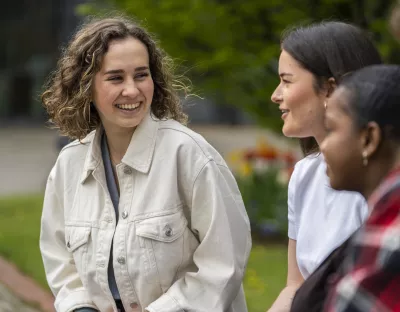Key Info
Bachelor of Arts in European Studies
Why study European Studies at UL?
European Studies in the University of Limerick is a broad and integrated world-class programme. It allows students an in-depth opportunity to study European languages and policy and equips them with highly sought-after digital and research skills. It is also the only European Studies programme in Ireland which includes Irish as one of its language options.
Brexit means more direct interaction with the EU and with individual member states on the continent. A better knowledge of the European Union, and Ireland’s place within it, is more needed than ever before. An understanding of Europe requires knowledge of its historical origins, of its economic, legal and societal aspects, and of its political institutions. The BA in European Studies develops knowledge and understanding of all of these areas linking them with knowledge of the cultures and languages of key member states. The University of Limerick has long led the way in Ireland in this field, with the result that this degree is one of the longest established European Studies degree programmes in Europe.
About you
There is no ‘typical’ European Studies student. The main qualities that you need for success in the field are;
- A healthy curiosity about how modern societies function
- An interest in the European Union, and the issues facing the Union and its member states
- a taste for languages other than your own
- An interest in developing digital and research skills
- An interest in working in teams and working independently
- an interest in other cultures and
- an ability to think independently and argue coherently for your ideas.
Neither do you have to know what you want to ‘be’ when you leave college in order to choose European Studies. The degree offers a very broad entrance into the worlds of Humanities, Languages and Social Sciences.
Jean Monnet European Studies Entrance Bursary
Students of the BA European Studies are eligible for the Jean Monnet European Studies Entrance Bursary. The Bursary to the value of €2,000 is awarded annually to an incoming student on this programme who achieves the highest CAO points.
Learn more about our courses and upcoming events
What you will study
Electives and Pathways in European Studies
It is mandatory for all students to take a general European Studies module.
Students must also study one of the below European languages.
Along with the mandatory modules, there are a number of electives available, as you will have the freedom to select 3 of the below subjects.
- Language 2 - French, German, Spanish, or Irish
- History
- Economics
- Law
- Politics/ Public Administration
- Marketing
- Sociology
- European Literature and Film - (choose 2) French, German, Spanish
German and Spanish are available at beginners' and advanced levels. French and Irish/Gaeilge are only available at advanced level.
What you will study
The BA in European Studies offers you a core European Studies programme and a wide degree of choice between options in European History, Sociology, Politics, Economics or Marketing, Law and European Literature & Film, as well as the opportunity to develop an in-depth knowledge of French, German, Irish / Gaeilge and Spanish languages and cultures. Language teaching takes place in small groups and many of the teachers are native speakers of the languages concerned. Language skills are further developed during the period of study abroad at one of our partner universities on the continent, completion of which is mandatory for students of the BA in European Studies.
The BA in European Studies is a four-year programme. Six semesters, including all of the first and final years, are spent in UL. A further two semesters, in the spring of Year 2 and autumn of Year 3, are spent off-campus on the Study Abroad programme and on the Cooperative Education programme, which provides work experience.
In year 4, students continue with Language 1 and the Final Year Project. They are otherwise free to choose from a range of modules available in the participating subjects.
* NB: Students choosing Irish / Gaeilge must also study a continental language.
Note - Students decide their chosen route in European Studies by Week 4 of Year 1.
| Year 1 |
Semester 1 |
|---|---|
| ES4001 |
Introduction to European Studies |
|
Language 1 (choose 1)
|
|
|
Students Choose 3 Electives: |
|
|
Language 2 (choose 1)
|
|
| HI4112 | History: Sources for History |
| EC4111 | Economics: Microeconomics |
| LA4901 | Law: Principles of Law |
| PO4051 | Politics/Public Admin: Introduction to Politics and International Relations 1 |
| EC4111 | Marketing: Microeconomics |
| SO4001 | Sociology: Introduction to Sociology |
|
European Literature and Film (choose 1)
|
|
Semester 2 |
|
|---|---|
| ES4002 |
European Studies Workshop |
|
Language 1 (choose 1)
|
|
|
Students Choose 3 Electives: |
|
|
Language 2 (choose 1)
|
|
| HI4081 | History: Early Modern Ireland |
| EC4112 | Economics: Macroeconomics |
| LA4012 | Law: Comparative Legal Systems |
| PO4052 | Politics/Public Admin: Introduction to Politics and International Relations 2 |
| EC4112 | Marketing: Macroeconomics |
|
Sociology (choose 1)
|
|
|
European Literature and Film (choose 1)
|
Note - Students stay on chosen route
| Year 2 | Semester 3 |
|---|---|
| PO4023 | Comparative European Politics |
|
Language 1 (choose 1)
|
|
| Students Choose 3 Electives: | |
|
Language 2 (choose 1)
|
|
| HI4061 |
History (choose 1)
|
| EC4027 | Economics: The European Economy |
| LA4033 | Law: Law of the European Union 1 |
|
Politics/Public Admin (Choose 1)
|
|
| MK4603 | Marketing: Marketing |
| SO4047 | Sociology: Sociology of the Welfare State |
|
European Literature and Film (Choose 1)
|
| Semester 4 |
|---|
| Cooperative Education |
Note - Students stay on chosen route
| Year 3 | Semester 5 |
| Erasmus/Exchange placement with a partner institution abroad |
| Semester 6 | |
| PO4015 | Government and Politics of the EU |
Language 1 (Choose 1)
|
|
| Students Choose 3 Electives: | |
Language 2 (Choose 1)
|
|
History (Choose 1)
|
|
| EC4014 | Economics: International Economics |
| LA4044 | Law: Law of the European Union 2 |
Politics/Public Admin (Choose 1)
|
|
| MK4025 | Marketing: Marketing Communication |
Sociology (Choose 1)
|
|
European Literature and Film (Choose 1)
|
|
| Available as an Additional Module: | |
| TE4106 | Teaching English to speakers of other languages - TESOL 1 |
Note - In year 4, students continue with Language 1 and the Final Year Project. They are otherwise free to choose from a range of modules available in the participating subjects.
| Year 4 | Semester 7 |
| HP4067 | ES: Stream (European Studies FYP 1) |
| Language 1 module | |
| PLUS 3 electives from streams (NB: students have the option to take one or two European Studies Specialisation modules (see below) instead of their streams) |
|
Selection of modules available within European Studies Specialisation option (max. 2)
Available as an additional module TE4107 Teaching English to speakers of other languages (TESOL ) 2 |
| Semester 8 | |
| HP4068 | ES: Stream (European Studies FYP 2) |
| Language 1 module | |
| PLUS 3 electives from streams (NB: students have the option to take one or two European Studies Specialisation modules (see below) instead of their streams) |
|
Selection of modules available within European Studies Specialisation options (max. 2)
Available as an additional module TE4108 Teaching English to speakers of other languages (TESOL) 3 |
Entry requirements
| CAO points history |
398
|
|---|---|
| Minimum grades |
Applicants are required to hold at the time of enrolment the established Leaving Certificate (or an approved equivalent) with a minimum of six subjects which must include: Two H5 (Higher level) grades and Four O6 (Ordinary level) grades or four H7 (Higher Level) grades. Subjects must include Mathematics, Irish or another language, and English. Note: Grade F6 in Foundation Mathematics also satisfies the minimum entry requirements. Foundation Maths is not reckonable for scoring purposes. |
| Subject requirements |
Applicants must hold a H3 grade in a language other than English. Students wishing to take the two language options with Irish/Gaeilge must hold a minimum H3 grade in Irish/Gaeilge. |
| Additional considerations |
Mature StudentsWe welcome applications from Mature Students. Mature applicants must apply through the Central Applications Office (CAO) by 1 February. Application information for mature student applicants QQI AwardsCertain QQI awards are acceptable in fulfilling admission requirements for this programme. Go to www.ul.ie/admissions for more information and a full list of modules. |
| Non-EU Entry Requirements |
|
How to apply
| Where are you applying from? | How to Apply |
|---|---|
| Ireland | Irish students must apply to UL via the CAO. More information can be found here. |
| The UK | Students who have completed their A-Levels can apply to UL via the CAO. More information can be found on the Academic Registry website. |
| The EU | EU students can apply to UL via the CAO. More information can be found on the Academic Registry website. |
| Non-EU country | If you are outside of the EU, you can apply for this degree here. |
Fees and funding
Student course fees are broken into three components - Student contribution, Student Levy and Tuition Fees.
A number of illustrative examples of fees for this course based on the current fee levels have been set out in the tables below.
An explanation of the components, how to determine status and the criteria involved is provided below the examples as is a list of possible scholarships and funding available.
EU Students with Free fees status in receipt of a SUSI grant
| HEA pays | Tuition Fees | €2,558 |
| SUSI pays | Student contribution | €3,000 |
| Student pays | Student Levy | €102 |
| Total | €5,660 |
EU Students with Free fees status not in receipt of a grant
| HEA pays | Tuition Fees | €2,558 |
| Student pays | Student contribution | €3,000 |
| Student pays | Student Levy | €102 |
| Total | €5,660 |
Students with EU fee status not in receipt of a grant
| Student pays | Tuition Fees | €2,558 |
| Student pays | Student contribution | €3,000 |
| Student pays | Student Levy | €102 |
| Total | €5,660 |
Non-EU Students
| Student pays | Tuition Fees | €16,798 |
| Student pays | Student Levy | €102 |
| Total | €16,900 |
Student course fees are comprised of the following components:
Student Contribution
Annual charge set by the government for all full-time third level students. All students are liable unless they have been approved for a grant by Student Universal Support Ireland (SUSI). Please refer to https://www.studentfinance.ie to determine your eligibility for a grant and for instructions on how to apply. The current student contribution is set at €3000.
Student Levy
All students are liable to pay the Student Levy of €102. Please note the Student Levy is not covered by the SUSI Grant.
Tuition Fees
These are based on Residency, Citizenship, Course requirements.
Review the three groups of criteria to determine your fee status as follows
-
Residency
- You must have been living in an EU/EEA member state or Switzerland for at least 3 of the 5 years before starting your course
-
Citizenship
- You must be a citizen of an EU/EEA member state or Switzerland or have official refugee status
-
Course Requirements
(all must be met)
- You must be a first time full-time undergraduate (Exceptions are provided for students who hold a Level 6 or Level 7 qualification and are progressing to a Level 8 course in the same general area of study).
- You must be undertaking a full-time undergraduate course of at least 2 years' duration
- You cannot be undertaking a repeat year of study at the same level unless evidence of exceptional circumstances eg serious illness is provided (in which case this condition may be waived)
Depending on how you meet these criteria your status will be one of the following -
- Free Fee Status: You satisfy all three categories (1, 2 and 3) and therefore are eligible for the Higher Education Authority’s Free Fees scheme.
- EU Fee Status: You satisfy both the citizenship and residency criteria but fail to satisfy the course requirements and are liable to EU fees.
- Non EU Fee Status: You do not meet either the citizenship or residency criteria and are therefore liable to Non EU fees.
More information about fees can be found on the Finance website
These scholarships are available for this course
| Title | Award | Scholarships Available |
|---|---|---|
| Jean Monnet European Studies Entrance Bursary | €2,000 | 1 |
| Johnson and Johnson WiSTEM2D Programme |
These scholarships are available for all courses
| Title | Award | Scholarships Available |
|---|---|---|
| All Ireland Scholarships - sponsored by J.P. McManus | €6,750 | 125 |
| Brad Duffy Access Scholarship | €5,000 for one year | 1 |
| Bursary for my Future Scholarship | €2,750 one off payment | 4 |
| Civic Engagement Scholarship | €1500 | 1 |
| Cooperative Education Award | 1 medal per faculty | |
| Elaine Fagan Scholarship | €1,500 | |
| Financial Aid Fund | ||
| Hegarty Family Access Scholarships | €5,000 for one year | 2 |
| Higher Education Grants & VEC Grants | ||
| Irish American Partnership Access Scholarships | €5,000 | 2 |
| Paddy Dooley Rowing Scholarship | €2,500 | |
| Plassey Campus Centre Scholarship Programme | ||
| Provincial GAA Bursaries Scheme | €750 | |
| Stuart Mangan Scholarship | ||
| The Michael Hillery and Jacinta O’Brien Athletics Scholarship | Various benefits equating to over €7,000 in value | |
| UL Sports Scholarships | Varies depending on level of Scholarship | Multiple |
Your future career
Employability skills from this degree
- Gathering, assessing, and interpreting information
- Leading and participating in discussions and groups
- Developing opinions and proposing ideas
- Reading text to pick out the essential points
- Digital skills in research, communication and analysis
- Adapting to new and changing surroundings
- Working in teams and independently
- Verbal and written communication
- Organisation and working to deadlines
- Negotiation and management
Further Study Options
- MA in European Studies
- MA in Business Management
- MA in European Politics and Governance
- MA in Gender, Culture and Society
- MA in German Language and Culture in Europe
- MA in International Studies
- MA in International Tourism
- MA in Peace and Development Studies
- PME Professional Master of Education
Job titles for graduates with this degree
Graduates progressing directly into employment take up a wide variety of roles. The following provides a sample of initial roles listed on the Graduate Outcomes Survey by graduates approximately one year after graduation:
- Collections Agent
- Commercial Clerk
- Customer Service
- European Commercial Assistant
- Language Assistant
- Secondary School Teacher
- Marketing Assistant
- Public Relations Officer
- Recruitment Agent
- Sales Representative
- Secretarial Assistant
- Trade Development Executive
- Public Servant
- Civil Servant
Student Profiles

Aideen Ginnell
I chose UL for many reasons but the main attraction for me was mostly the campus itself, along with the charming and friendly feeling I got when I first visited on the open day. European studies appealed to me because the course included politics, languages, law, and history – all in one degree.
The added bonus of my course was the extraordinary opportunity to go on work experience (coop) and also to study abroad (Erasmus) whilst still receiving credits here in UL. I took the opportunity to study in Seville, Spain for one whole term. The university was situated right in the heart of the city and hosted many Erasmus students from all around Europe which really made the experience truly diverse. This mix, along with the small classes and fantastic weather, made for a great atmosphere around this lovely old Spanish campus.
For my coop, I was offered a job in Mexico, teaching English in a school in Mexico City, to kids aged from 4 up to 18. We also taught them about Irish music and dancing and organised a little show to celebrate St Patrick’s Day. Apart from the invaluable experience I gained from my teaching work, I also availed of the opportunity to travel around Mexico and experience its culture and richness. My time on co-op was one of the most eventful and valuable experiences of my life and it couldn’t have happened without the opportunities that were presented to me by my degree in European studies at the University of Limerick.
Jennifer Ess
Coming from Kilkenny, I chose UL because of the affordable costs of living, the amazing campus and its location, and the facilities that UL offers. What I like most about European Studies is the variety of subjects to study, as well as the inclusion of languages. Having the option to study a language throughout the four years was also desirable as I had a keen interest to continue German from school. UL’s Language Learning Hub is a great resource for language students and allows you to embrace the language even further.
Choosing to study at UL has provided me with several opportunities, the most important ones being ERASMUS/Study Abroad and Coop work experience. I really enjoyed my ERASMUS experience in Germany where I studied at the Ruhr Universität Bochum for 6 months. While there, I travelled a lot and visited cities like Aachen, Essen and Düsseldorf. I embraced the German culture and language and really tried to immerse myself in the country. My command of the language also improved even further.
My Co-Op placement in Hamburg was my first time working in a professional environment. As a Content Management intern with Dreamlines GmbH, my role was tasked with managing the data on their busy website. The experience prepared me for future employment, and gave me confidence and independence as I was living abroad alone for the first time. I improved many skills while on my placement such as problem-solving and communication, and learned so much as part of an international team. Because of Co-Op, I know what is expected of me as an employee, and what it is like to work in a professional environment. I am now better prepared for the workplace and for a career with both a European and international focus.





